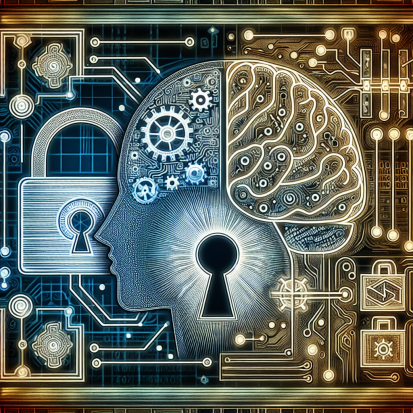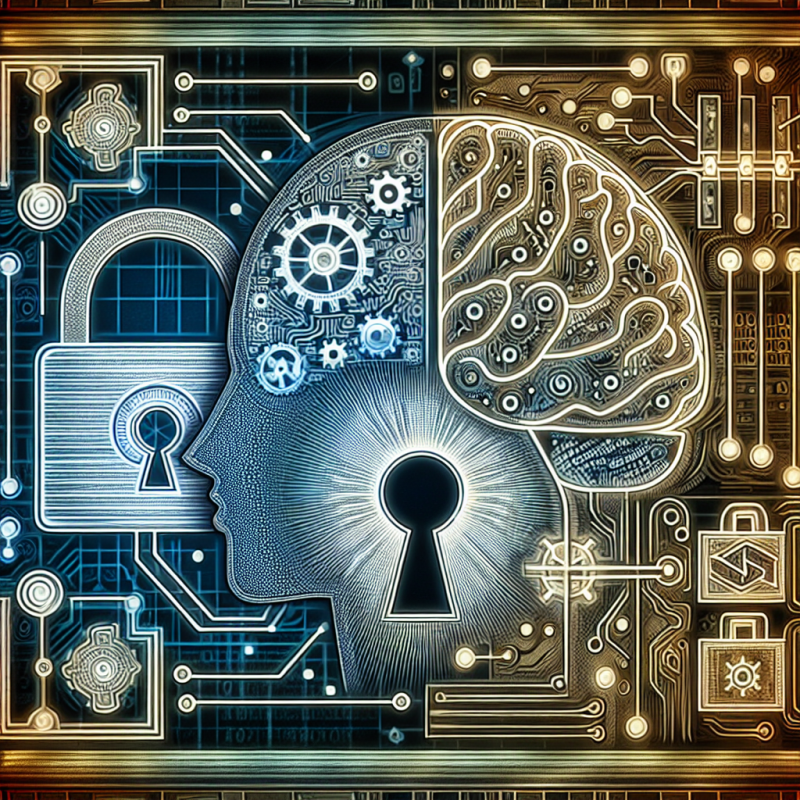Navigating Modern Technology: From Account Security to AI and Blockchain Innovations
Introduction
The 21st century has delivered an unprecedented wave of technological advancements that affect virtually every aspect of our daily lives. From the way we access digital services and store personal information to groundbreaking developments in artificial intelligence (AI) and blockchain, technology has evolved to become not just a tool, but a driving force shaping society’s future. However, more than just embracing the benefits of these innovations, it’s crucial for individuals to understand the associated challenges and risks.
As technology continues to grow at an exponential rate, the importance of staying informed about privacy policies, user agreements, and the safe use of innovative technologies has become a part of modern digital literacy. This article explores some of the critical aspects of user interaction with technology, from securing online accounts to the impact of AI and blockchain technology on various sectors, providing readers with a comprehensive understanding of how to navigate modern tech landscapes effectively.
The Basics of Secure Digital Access
Logging into an Account
One of the most common interactions we have with technology is logging into our accounts – whether for email, social media, or online banking. There are several ways most services now authenticate users, commonly through phone numbers, email addresses, usernames, and passwords. Understanding secure login processes is key to protecting your digital identity.
1. Methods: Using Phone Numbers, Email, or Usernames with Passwords
Users can typically log into services through a variety of identification methods, with email addresses and usernames being the most common. Increasingly, services would also allow users to log in via their mobile phone numbers, verifying identity through a one-time-use code sent via text message.
2. The Importance of Agreeing to User Agreements and Understanding Privacy Policies
Whenever we sign up for a service, we are usually prompted to agree to a User Agreement or Terms of Service. While most users might hastily click “accept,” these agreements outline how your personal data will be used, stored, and shared. Understanding these rules and being mindful of what permissions a service might be asking can greatly protect your privacy online.
3. Password Recovery Options for Forgotten Credentials
Forgetting credentials is an all too common problem. Fortunately, almost all services now offer password recovery options, often involving multi-factor authentication methods that add extra layers of security during the recovery process. Users should ensure that any service they sign up for has clear and secure recovery protocols in place.
The Rapid Development of Artificial Intelligence (AI)
Summary of Insights from Dario Amodei on "The Ezra Klein Show"
AI has become a cornerstone of many industries, from healthcare to finance. One of the key voices in contemporary AI development, Dario Amodei—CEO and co-founder of Anthropic, a cutting-edge AI research organization—discusses the transformative effect AI will likely continue having in the coming decades. Appearing on "The Ezra Klein Show," Amodei shared insights on the rapidly evolving nature of AI technologies, such as those powered by 'scaling laws'—the mathematical formulas that allow AI systems to exponentially advance as they process increasing amounts of data.
1. Exponential Growth of AI Capabilities Through Scaling Laws
Amodei highlighted how AI systems improve in performance not just linearly, but exponentially, with more data and computational power. This rapid growth has caught many people off-guard, as it has outpaced societal norms and regulations, leaving a gap between technology's promise and society's ability to manage it responsibly.
2. Societal Lag in Adapting to AI's Rapid Advancements
Despite AI’s immense potential, societal infrastructure has struggled to keep pace. We are beginning to encounter situations where everyday users interact with AI-powered services without fully understanding the depth and complexity of these technologies. As a result, there can be an imbalance where AI outstrips regulatory frameworks, raising concerns about control, safety, and ethical management.
Challenges and Ethical Considerations
1. Power Concentration in Select Companies and Associated Risks
The control over AI development remains concentrated primarily within a small group of private companies. This scenario presents unique ethical and governance challenges. While these companies have the resources to spur innovation, the consolidation of power into just a few entities could lead to unequal benefits distribution, making it imperative to create checks and balances for how AI tools are developed and deployed.
2. Future AI Systems and Real-World Implications on Safety and Control
As AI systems evolve, they are poised to make decisions that have real-world consequences, raising questions about their operational safety and accountability. These systems, which are capable of autonomy, have the potential to influence healthcare, transportation, and even public policy decisions. Ensuring that these systems are designed and tested with safety as a priority is critical to mitigate potential harms when AI inevitably has greater influence over everyday life.
Practical Applications and Risks
1. AI's Role in Drug Discovery and Efficiency Improvements in Various Sectors
One of the most breathtaking applications of AI technology comes in the healthcare sector, particularly in drug discovery. AI allows for an expedited process of identifying potential medical treatments by analyzing vast datasets far quicker than any human could manage. Beyond healthcare, industries like logistics, customer service, and finance are also benefiting from increased automation and efficiency brought about by AI tools.
2. Potential for Misuse in Biological and Computational Contexts
Despite immense potential for good, there is also significant risk if AI is misappropriated. In biological contexts, AI could be misused for creating harmful pathogens, while in cybersecurity, AI systems could be weaponized to carry out advanced hacking operations or disrupt vital services. These risks underscore the need for vigilant monitoring of how AI systems are developed and applied.
Call for Public Discourse and Regulation
1. Balancing AI Benefits with its Disruptive Potential in Labor, Education, and Commerce
AI's increasing role across numerous sectors signifies that it will inevitably have a profound impact on society at large, leading to disruptions in fields like labor, commerce, and education. The displacement of jobs through AI-driven automation highlights the need for policies that ensure equitable transitions for workers. In education, AI tools could profoundly augment learning experiences, but misuse could also give rise to ethical and privacy concerns.
2. Recommendations for Further Educational Resources
To better understand AI, users should take advantage of educational resources offered by reputable organizations. Sites like Coursera, Khan Academy, and OpenAI provide extensive learning materials for individuals interested in developing a full understanding of AI. Increasing awareness and education about AI will remain vital to reaping AI's benefits while mitigating its risks.
The Envisioned Future of Artificial General Intelligence (AGI)
Amodei's Predictions on AGI by 2026
1. Characteristics of Powerful AI Systems
Dario Amodei made a grounded prediction regarding the potentially rapid development of Artificial General Intelligence (AGI) by 2026. AGI, unlike its more task-specific predecessors, is expected to perform any intellectual task that a human can do—potentially leading to breakthroughs in highly technical fields like biology, chemistry, and neuroscience.
2. Potential Impact on Fields like Biology and Neuroscience
The implications for scientific progress could be profound. In biology, for example, AGI could help us unlock the secrets of complex systems, from decoding genomic structures to modeling ecosystems with unparalleled accuracy, enabling new discoveries and improvements in disease treatment.
Current Debates on AI Reasoning Capabilities
1. Skepticism About Large Language Models' Ability to Reason
Despite optimistic predictions, experts remain divided on whether today’s large language models, like OpenAI’s GPT (Generative Pre-trained Transformer), can truly "reason." These models are incredibly adept at pattern recognition and statistical analysis based on prior inputs, but there are still doubts around their abilities to replicate critical reasoning, creativity, or intuition commonly associated with human intelligence.
Legal and Ethical Battles in AI and Content Use
1. New York Times' Cease-and-Desist against Perplexity.ai
AI content aggregators have sparked contentious debates around intellectual property and ownership of AI-generated content. A notable case involved The New York Times issuing a cease-and-desist letter to Perplexity.ai, a platform that uses AI to condense and present content, raising concerns about the ethics and legality of scraping long-form written work to present users with condensed versions without attribution.
2. AI's Potential Influence on Societal Norms and Ethical Standards
As AI gains more complex abilities, its growing influence on societal norms and standards is inevitable. AI-generated content, for instance, could challenge traditional notions of creativity, labor, and even moral responsibility, urging society to carefully assess how AI influences arts, culture, and human livelihood.
Artificial Intelligence and Educational Settings
The Impact of AI on Decision-Making, Laziness, and Safety
Artificial Intelligence is making its way into educational settings, promising both opportunities and challenges. Studies have shown that AI systems, particularly when integrated into modes of learning, can sometimes inhibit creativity by encouraging learners to over-rely on algorithms that make decisions for them. There is also debate on how AI might exacerbate issues of laziness in decision-making and creative outputs, particularly if students come to heavily depend on AI assistance in generating homework or projects.
1. Key Findings from Studies on AI's Influence on Students
Studies show mixed results. While some students benefit from AI applications that increase learning efficiency and accessibility, others report a decline in original thinking when AI tools do most of the heavy lifting—whether by answering complex problems or auto-generating ideas.
Policy Recommendations for Educational Institutes
To properly balance the advantages of AI with the challenges it presents in an educational setting, policy updates are necessary for educational institutions:
- Curriculum Inclusion: Schools should include AI literacy as part of the curriculum, enabling students to use AI productively rather than rely on it blindly.
- Focus on Creativity: Encourage curricula that require manual problem-solving and creativity, with AI as a supplementary tool rather than a crutch.
- Integrity Safeguards: Establish policies that address over-dependence on AI in student assignments to ensure authenticity in student work.
Broader AI Implications and Public Engagement
Future Predictions of Human-AI Collaboration
1. Optimistic and Concerned Views on AI's Influence by 2030
Looking ahead to 2030, experts remain divided when predicting AI’s impact on future human-AI collaboration. Optimists anticipate improvements in quality of life due to automation, more effective problem-solving, and reduced human involvement in dangerous or undesirable jobs. On the other end of the spectrum are those concerned about potential job loss, data privacy, and questions surrounding human dignity and purpose in a heavily automated world.
The Need for Societal Engagement and Governance
1. Encouraging Public Discourse and Understanding for Responsible AI Integration
For AI to be safely and ethically integrated into society, public discourse is paramount. Policymakers, technologists, and the general public all need to engage in conversations shaping the future of AI. Governments and international bodies should work to enact regulatory frameworks to ensure that AI benefits are shared by all while mitigating harms such as job displacement or economic inequality.
Blockchain and Cryptocurrency Evolution
Regulatory Developments in Cryptocurrency
1. The FIT21 Act and Its Implications on the Crypto Market
The cryptocurrency industry continues to evolve as governments move towards clearer regulatory standards. The FIT21 Act, for instance, seeks to introduce appropriate governance measures over digital assets while still encouraging innovation in blockchain ecosystems. This balance is especially critical as the volatility of cryptocurrency markets introduces both enormous potential and serious financial risks for consumers, institutional investors, and developers alike.
The Rise of Blockchain Gaming
1. Market Expansion Driven by Innovations Like NFTs and Decentralized Finance
Blockchain has also begun reshaping the gaming industry, thanks to innovations such as Non-Fungible Tokens (NFTs) and decentralized finance opportunities. Blockchain-based games are not just about gameplay; they offer players the ability to truly own in-game assets, creating new economies around trading and the minting of digital goods. This democratization of digital property in games signals profound changes for the gaming industry, blending entertainment with investment opportunities.
2. Key Trends Shaping the Future of Gaming
Some experts foresee a future where blockchain gaming blends seamlessly with more traditional gaming experiences, using decentralized finance elements like staking, lending, and liquidity pools to create entirely new, player-driven economies within massive virtual worlds. Expect to see a growing integration of metaverse concepts alongside advancements in AI and immersive experiences, creating a new frontier of entertainment.
Conclusion
The continued evolution of technology from AI innovations to blockchain and beyond offers remarkable opportunities as well as nuanced challenges. As technological developments accelerate, it is vital to maintain a structured equilibrium between embracing new advances and critically assessing their broader societal impacts and risks.
A balanced approach to technology integration—in which both the public and leaders in government and industry work together—will help ensure the responsible development and deployment of technology as it reshapes key facets of our modern world. At the same time, we must encourage a culture of continuous learning, curiosity, and public discourse to navigate technology’s rapid progress.
As exciting as these technological advances are, society must remain vigilant in understanding and addressing the challenges they bring, from fairness and equity issues in AI use to the governance of emerging blockchain-powered economies and much more.


